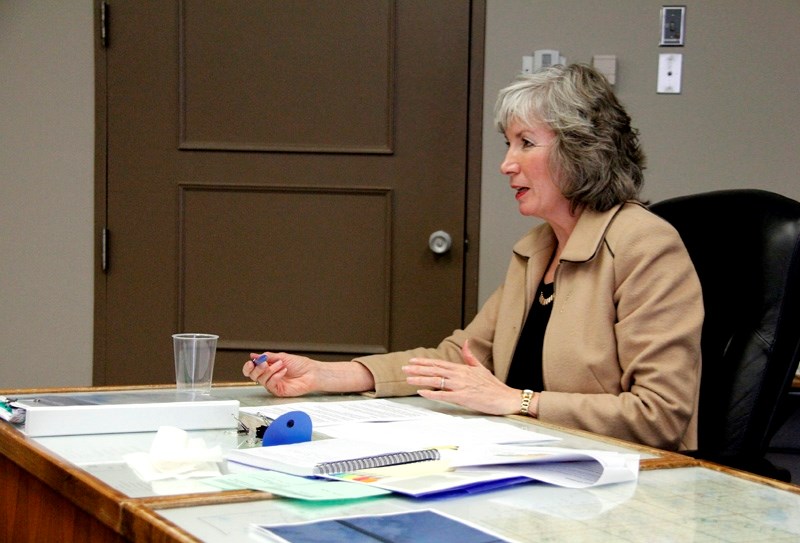Minister of Culture and Tourism and MLA for Barrhead-Morinville-Westlock Maureen Kubinec made a guest appearance at the Barrhead County Council meeting on Tuesday, Feb. 17 to discuss Alberta's current fiscal situation.
Minister of Culture and Tourism and MLA for Barrhead-Morinville-Westlock Maureen Kubinec made a guest appearance at the Barrhead County Council meeting on Tuesday, Feb. 17 to discuss Alberta's current fiscal situation.
Kubinec started the meeting with a simple statement, “the sky is not falling,” and encouraged councillors to share their views, and ideas in ways of bringing back the economy.
Populations across the province are continuing to grow, and in order to meet those demands, approximately 22 schools will need to be built per year, a huge provincial cost.
“We are still failing the growth issues,” Kubinec said, adding Fort McMurray's birth rate continues to expand.
“While we are struggling to keep up with the demand for infrastructure… there is a great deal of uncertainty because of the declining oil prices,” Kubinec said.
Whether or not the oil prices will bounce right back, or will slowly grow over time is still being determined, however Kubinec said the government believes it could take a few years.
“We think it's not going to change next month, this could be one year or two years,” she said.
The price of oil has always stabilized the provincial budget, and this year, in order to make up for the shortfall, there needs to be some changes.
“For every single dollar drop in the price for a barrel of oil over a year, Alberta loses $215 million in direct revenue,” Kubinec said.
Kubinec said if the province were to continue with business as usual there would be a shortfall of $6 - $7 billion this fiscal year.
“That's the equivilant of the entire education budget, or one third of the salaries of the entire public sector… so as the Premier says, this is not business as usual,” she added.
The changes being made will still continue even if oil prices rebound.
“We can't control international oil prices or wait for them to climb back up, but what we can do is use sound, disciplined fiscal management, and keep spending in check,” Kubinec said, adding changes are being implemented so future generations are not faced with the same issues.
Kubinec told council the province doesn't determine the price of oil.
“We have to take what we are given for oil, those processes are depressed anyway thanks to oversupply in the global market,” Kubinec said, adding it's affecting more than just Alberta.
“It's affecting the rest of Canada too because Alberta has been the economic engine for the last little while,” Kubinec added.
Another impact on Alberta's fiscal situation is the current job market.
“As jobs become a little bit tighter people may lose their jobs, or their hours are cut back, that does affect our income as well in the income tax area,” Kubinec said.
From 2013 to 2014 personal income tax made up 21 per cent of the overall Alberta Government revenue with resource revenue taking the lead with the most revenue at 29 per cent.
Cutbacks being made to minimize costs vary from the use of colour printing to the number of employees kept on staff.
“Premier Prentice has also announced a three-point plan to restrain internal government expenditures. Payroll and staffing costs are our biggest costs,” Kubinec said.
Filling only necessary positions is one of the points noted in the premier's plan, and since December, the government has seen a recruitments reduction of nearly 30 per cent.
“In my own department of culture and tourism, it was early December that we said, no more hiring, if there are vacant positions they're not filled, the work is just going to be spread around,” Kubinec said.
Some of the ideas the government have to make up for the shortfall include tourism, cutbacks, and the contingency fund.
“We need to grow tourism, and we have a plan to grow tourism,” she said.
Kubinec told council that imposing a sales tax is unlikely, although there are some Albertans who are for the idea.
“We are willing to listen to what they have to say, but by no means is this government committed to a sales tax, it's in the discussion but I highly doubt that will happen,” she said.
The use of the $5 billion contingency account as a means of transitioning to a long-term sustainable fiscal plan is another idea that is currently in the talks.
“We do have that $5 billion, we are not going to spend it all in the first year, I can see us using it over several years as a way of getting us back to a healthier place,” Kubinec said. “That is going to serve as a bit of a shock absorber.”
Kubinec asked councillors what they believe the province can do in order to make up for the shortfall, and told council their ideas would be shared with the Alberta finance minister.
Reeve Bill Lee suggested implementing a sliding fuel tax, a tax that would keep oil at a consistent price, so rather than residents seeing a drop when oil prices are low, it remains the same.
Coun. Darrell Troock said the cost of gravel is astronomical.
“I don't know why we buy it, we can supply it, it's in the ground,” he said.
Deputy Reeve Doug Drozd suggested the province stop relying so heavily on oil for revenue.
“We need to get our revenue away from the well head… and base it on something a little bit different,” Drozd said.
